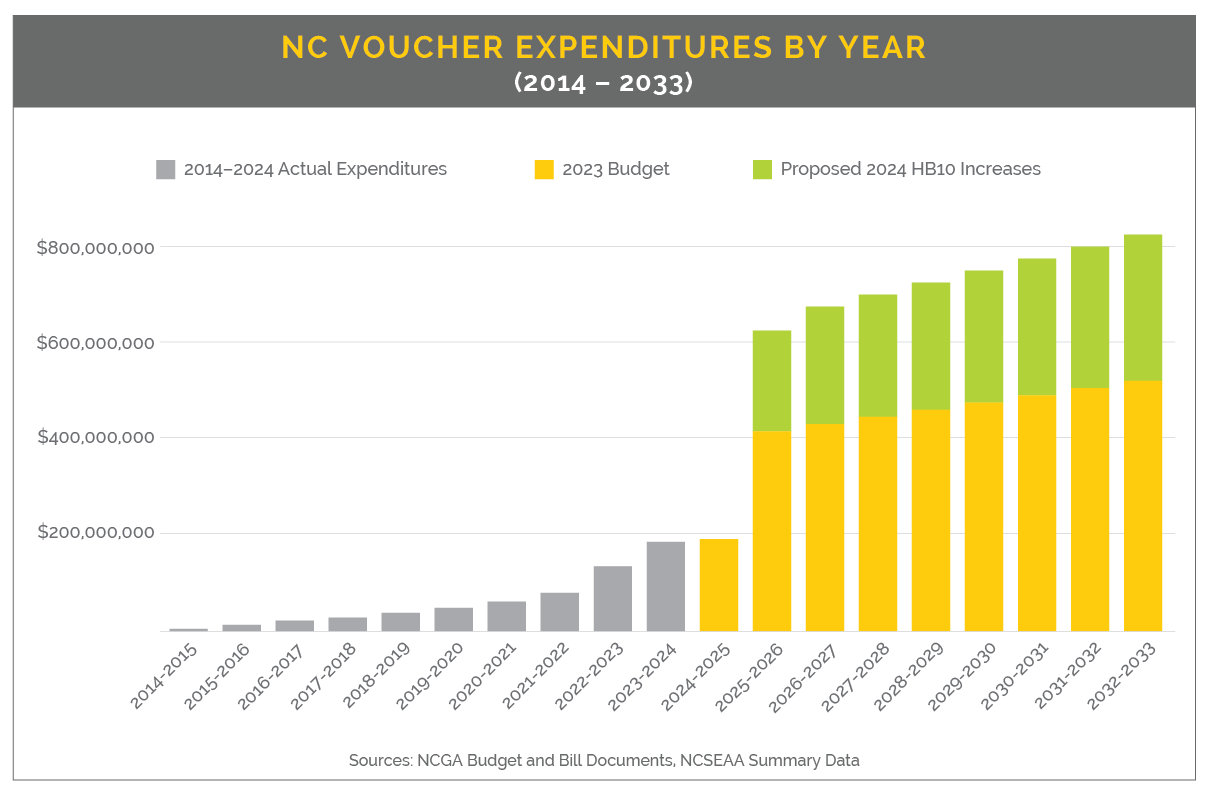RALEIGH (January 2, 2025) – North Carolina’s General Assembly seems to consider itself all-powerful.
Well here’s hoping that changes with the new year. Republicans lost their supermajority in the state House by a single seat in November’s elections, giving Gov. Josh Stein slightly more bargaining power with the legislature than his predecessor Roy Cooper had.
So here is a wish list for public education in North Carolina:
Raise teacher pay.
The way this state treats its public school teachers is an embarrassment.
Elected officials crow about an educated workforce. But the state cannot maintain its status as the No. 1 or No. 2-ranked state for business if it fails to fortify the public schools that more than 80% of North Carolina students still attend.
North Carolina ranks 42nd in starting teacher pay and was projected last year to rank 41st in average teacher pay.1 The state began the school year with more than 3,000 teacher vacancies – but only because it hired more than 5,000 teachers who were not licensed.2
A legislative committee even acknowledged last year that pay for North Carolina teachers has failed to keep up with inflation.3 Unless that was an election-year stunt, legislators need to act on that realization this year.
Revere our teachers.
New State Superintendent Mo Green has emphasized character education and the need to not just respect, but revere public school teachers for what they do to change students’ lives.
Restore income limits on vouchers.
In late 2023, state legislators – who first introduced North Carolina’s “Opportunity Scholarships” as a way to give school choice to low-income families – removed any limits on income for voucher applicants.
And demand exploded from 12,000 applicants to 72,000. The legislature then voted for a massive expansion in taxpayer funds for private school vouchers.
Though North Carolina’s state constitution says the General Assembly must provide “a general and uniform system of free public schools,”4 there is no question that vouchers divert taxpayer dollars from public schools.
Gov. Roy Cooper made it clear that “private school vouchers are the biggest threat to public schools in decades” as he vetoed the bill.5
Yet legislators overrode Cooper’s veto, and even students who were already attending private schools qualified for vouchers. One columnist aptly called it “welfare for the well-off.”6
We need to be sure public schools are fully funded before we send taxpayer dollars to private schools.
Uphold Leandro.
For more than 30 years, lawyers have argued over whether the state does enough to support its public schools and the state Constitution’s guarantee of a “sound, basic education.”
Yet the evidence has shown the state has failed to honor that promise. The NC Supreme Court has found – in four separate decisions since 1997 – that the General Assembly has defaulted on that promise.
Legislative “leaders” continue to contest the case, which is yet again pending before a now legislature-friendly NC Supreme Court.
And for the second year in a row, North Carolina ranks 49th in the portion of its economy it devotes to K-12 public schools, and 48th in per-pupil spending.7
Clearly, this state can do better. But it won’t unless we hold our state legislators accountable.
Support intensive tutoring.
Test scores show that North Carolina students are gradually recovering from learning loss they suffered during remote learning in the COVID pandemic.8
But federal funds to support intensive tutoring that has helped students recover have ended. Guilford County, in particular, struggled to patch together $784,000 to continue the tutoring.
Students – particularly in middle schools – have not fully recovered from the pandemic exercise in remote learning.9
School districts – perhaps with the state’s help – need to find continuing revenue sources to support that tutoring.10
1 https://www.newsobserver.com/news/local/education/article288227865.html.
2 https://www.newsobserver.com/news/local/education/article292374609.html.
3 https://publicedworks.org/2024/03/legislative-epiphany-teacher-pay-hasnt-kept-up/.
4 https://www.ncleg.gov/Laws/Constitution/Article9, Section 2.
7 https://edlawcenter.org/assets/MTG-2023/Making-the-Grade-23-Report.pdf; https://www.wunc.org/education/2024-12-13/nc-ranks-49-school-funding-effort-education-law-center-making-the-grade.
8 https://www.newsobserver.com/news/local/education/article296572639.html.


Roger Mayers says
The State of NC ranks 41st in average teacher pay. However, the state of NC ranked 37th in 2023 for per capita personal income.
Does this mean we are striving to raise average teacher pay to 37th in the nation?